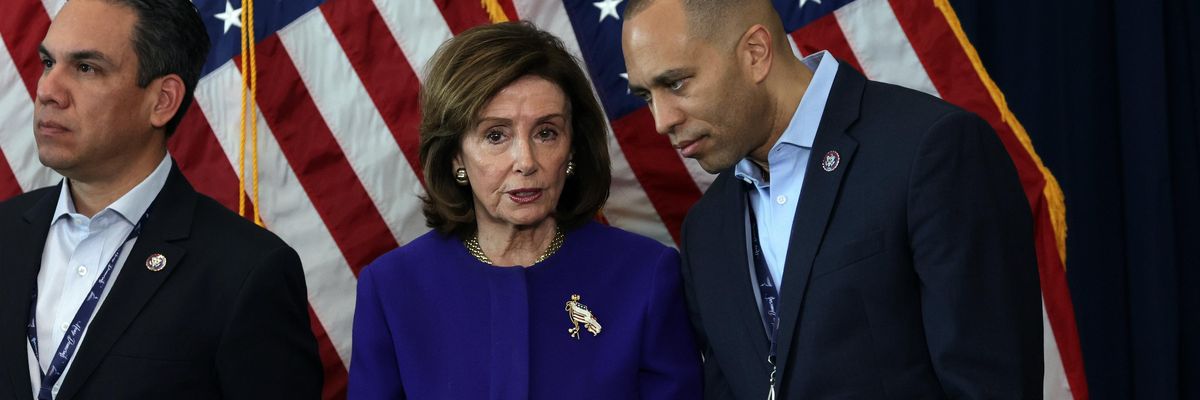With so much of the recent talk about House Speaker Emerita Nancy Pelosi’s political future—Will she run again? If not, who will succeed her? and her past: her 2023 Award of Honor from the American Hospital Association “for her efforts to advance health care throughout her career”—San Franciscans might easily forget that she is not San Francisco’s Representative Emerita, but is actually San Francisco’s Representative for real. But the fact is that there’s a need for some real representation coming up, real soon, that she needs to get on top of.
On May 16, Representative Pramila Jayapal (D-Wash.) and Sen. Bernie Sanders (I-Vt.) will be taking the lead in introducing this year’s Medicare for All Act in their respective branches of Congress. Now if you don’t live in the city and therefore don’t know any better, you might expect a San Francisco Representative to be all over this legislation. After all, it’s been 29 years since San Francisco first voted its support of universal health insurance when it backed the California Health Security Act, as 1994's Proposition 186 was properly known. The proposition would have established a single-payer health-care system under which the state’s government would have administered and financed health care coverage, thereby replacing most private health insurance programs. Unfortunately, the initiative was far ahead of its time, losing by a 73-27% margin and carrying but one of the state’s 58 counties. That county was San Francisco.
Unfortunately, however, the fact is that for all intents and purposes San Francisco’s electorate can’t touch Pelosi.
But in all of the intervening years, Pelosi, Congressional Representative for over 90% of San Francisco’s voters, has never seen fit to co-sponsor federal legislation embracing the same goal. For some time the justification advanced for Pelosi’s continual failure to promote the position of her constituents on one of the most crucial issues to come before Congress was her leadership role. Over the years, the standard routine whenever the San Francisco Democratic County Central Committee would pass a resolution urging Pelosi to co-sponsor a bill in Congress was that the staff member who served as her surrogate on the committee would explain that the Minority Leader or Speaker (depending on the year) didn’t sponsor legislation. It just wasn’t her role, and everybody simply needed to understand that and stop bothering her with these resolutions.
Central Committee meetings were not generally distinguished for their comedy or irony, but there was the one exceptional night when the Pelosi staff surrogate was fending off the latest attempt to influence the city’s member of Congress by intoning the standard explanation that the boss’s job was not to file bills—at the very moment that the late Central Committee member Michael Goldstein was in the act of passing out to each of the members a rather thick packet of all of the legislation that Pelosi had in fact sponsored. Suitably mortified when she learned the contents of the Goldstein handout, the staffer pleaded ignorance: “Well, that’s what they told me.” Presumably weary of such attempted intrusions by the public into the functioning of government, Pelosi’s office soon thereafter stopped sending surrogates to the meetings.
Since Pelosi is now the first Speaker Emerita, her office could conceivably adopt the position that Speakers Emerita simply don’t sponsor legislation, but ignoring the issue entirely seems the more likely path. The real underlying question here is just how closely Pelosi’s views hew to those of the American Hospital Association, the organization that loves her so well. In 2019 the AHA told the House Budget Committee that “‘Medicare for All’ is not the solution... we do not agree that a government-run, single-payer model is right for this country. Such an approach would upend a system that is working for the vast majority of Americans.”
Given that the AHA prefers working with private health insurers whose administrative overhead vastly exceeds that of the Medicare system—perhaps in part because the private insurance network has enabled the hospital administration system to increasingly resemble the health insurance bureaucracy, with a pay gap between its administrators and the physicians, nurses, and other actual service providers that is large and growing larger—the hospital association’s position may be understandable in terms of its own interests. But given that medical bills are currently the nation’s leading cause of bankruptcy, along with the fact that her district’s view on the matter is fairly well known, the AHA position would not be understandable for Pelosi. And yet it is far from clear that Pelosi’s position is not AHA’s.
Unfortunately, however, the fact is that for all intents and purposes San Francisco’s electorate can’t touch Pelosi. While we may hope for her to finally come around on one of the most important issues facing her district—and the district of every other member of Congress, it’s hard to imagine much of anything that would effectively pressure her in these, her Emerita days.
To a certain extent then, the question may be one for those who would aspire to succeed her. As the pundits see it, our choices on that front are quite limited, largely to people who aspire to continue her legacy. San Franciscans, on the other hand, may want to ask if there is any one of them out there ready to step forward, show us that they’re not just planning on being be more of the same, and publicly tell the Speaker Emerita what needs to be done—now.

